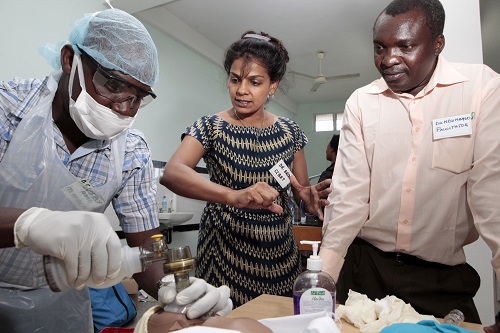“One-by-one, we will win life for all of our women.”
Girls’ Globe Hangout: Dr. Brenda D’mello & Abbey Kocan
Yesterday, our Executive Director, Abbey Kocan, joined Dr. Brenda D’Mello, manager of CCBRT’s maternal and newborn healthcare capacity building program, on our first Google Hangout with our friends at Girls’ Globe. The discussion highlighted the contrasting expectations and birth experiences of mothers in the U.S. and Tanzania, the challenges facing Tanzanian mothers, and the work we are doing to change this reality for thousands of women ever year. Here are just some of the highlights.
Worlds apart, in more ways than one
Expectant moms often talk about preparing a ‘hospital bag’, a bag of clothes, toiletries, and books for when the time comes to go to the hospital. As Dr. Brenda prepared to deliver her first child in Tanzania 18 years ago, her ‘hospital bag’ looked very different. For months, she stocked up on sterile supplies, and donated 2 units of her own blood to the hospital, just in case. She arrived at the facility with a checklist for the medical team, to guide them in case she lost consciousness and was unable to give instructions. She even refused pain medication because she wanted to be alert enough to supervise her own delivery. As a doctor in the middle of her residency she knew to prepare for the worst. Thankfully, her child was safely delivered.
In contrast, Abbey delivered her first child in New York 3 months ago. She had a healthy pregnancy, and expectations of a safe, respectful delivery, but says, “The work we do was in my mind through my entire birth experience.” When there were complications during delivery, Abbey was attended by a doctor and two supporting nurses for hours. When the decision was made to perform an emergency C-section, it took minutes to assemble the supplies and safely deliver her healthy son. Abbey never doubted the medical team, and had every confidence that they were equipped and ready to save her baby. If this had happened in Tanzania, Abbey’s son would have almost certainly been stillborn.
Facing the challenges
The greatest challenge facing Tanzanian healthcare teams, according to Dr Brenda, is a shortage of skilled human resources. There simply aren’t enough trained hands on the ground. Tanzania only has around two thirds of the human resources they need to meet demand, with approximately 4-7 health professionals for every 10,000 people.
CCBRT works closely with the Government of Tanzania, directly supporting 22 healthcare facilities in Dar es Salaam, and training thousands of medical workers in high quality antenatal care, safe delivery, anesthesia, facility management, and safe surgery as outlined by the WHO. “We cover a whole host of interventions,” says Dr. Brenda. “We invest in equipment and supplies, whatever is needed to provide the services to save lives.”
Kupona enables CCBRT’s life saving program by fundraising, raising awareness, and connecting CCBRT with technical experts to train teams on the ground. Recently, Kupona seconded a Harvard-trained OBGYN to CCBRT to teach safe surgical techniques to medical teams and serve as a technical advisor. Dr. Brenda reported, “I’m hearing from the field that the techniques are still being used. This [advisor’s] legacy is saving lives.”
As Dr. Brenda shared the story of a 15-year old patient who benefited from the improving maternal healthcare standards in Dar es Salaam, she said, ”Five years ago this would have been a tragedy. It’s so wonderful to see that one-by-one we will win life for all our women.”
Together, we’re shaping the future for Tanzanian mothers
Dr. Brenda’s vision for the women of Tanzania is simple: “That they have clean, compassionate care at the time of birth, delivered by a compassionate care provider.” This may seem like the expected bare minimum in the U.S., but for the women of Tanzania who have come to expect so little it means the difference between life and death. Abbey’s vision mirrors Dr. Brenda’s, “I want to see high quality integrated care for all mothers and babies in Tanzania, with higher expectations for respectful care.”
How can you help us accomplish this?
- Donate: A donation of $65 funds 1 hour of medical coaching and technical advisement for a Tanzanian healthcare provider. A donation of $500 funds a clean, respectful birth for a Tanzanian woman.
- Spread the word: Share this blog post, and the Google+ Hangout link with everyone you know.
- Get involved: Sign up for our mailing list, follow us on social media, and reach out if you would like to attend one of the fundraising events we host in the US.
Together, we can win life and respectful, maternal healthcare for the women of Tanzania.


